Citroen C1 2016 1.G User Guide
Manufacturer: CITROEN, Model Year: 2016, Model line: C1, Model: Citroen C1 2016 1.GPages: 269, PDF Size: 7.63 MB
Page 11 of 269
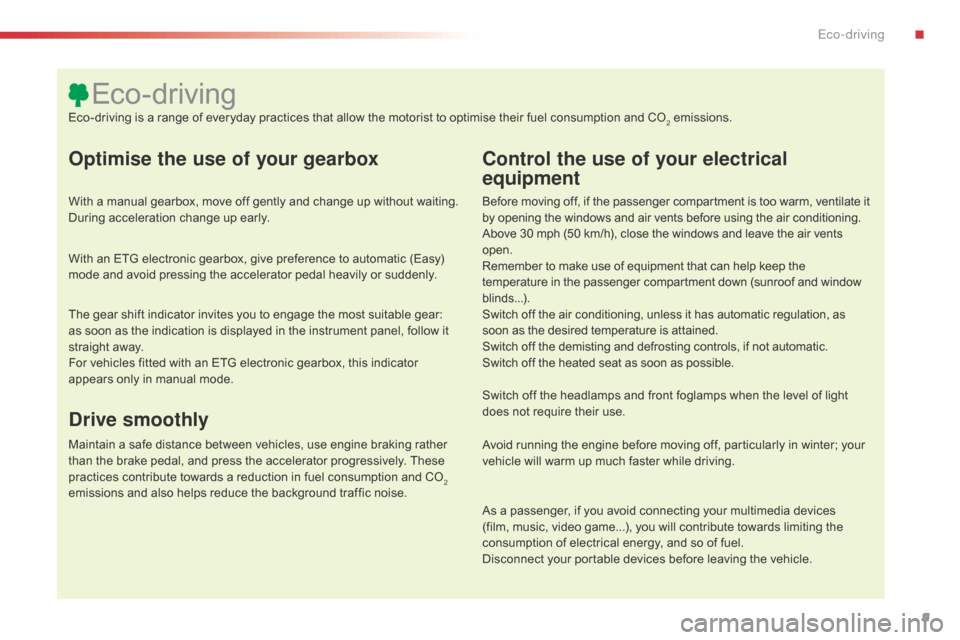
9
C1_en_Chap00c_eco-conduite_ed01-2016
Optimise the use of your gearbox
With a manual gearbox, move off gently and change up without waiting. During acceleration change up early.
With
an ETG electronic gearbox, give preference to automatic (Easy)
m
ode and avoid pressing the accelerator pedal heavily or suddenly.
Control the use of your electrical
equipment
Before moving off, if the passenger compartment is too warm, ventilate it by opening the windows and air vents before using the air conditioning.
Above
30 mph (50 km/h), close the windows and leave the air vents
ope
n.
Remember
to make use of equipment that can help keep the
t
emperature in the passenger compartment down (sunroof and window
b
linds...).
Switch
off the air conditioning, unless it has automatic regulation, as
s
oon as the desired temperature is attained.
Switch
off the demisting and defrosting controls, if not automatic.
Switch
off the heated seat as soon as possible.
Switch
off the headlamps and front foglamps when the level of light
d
oes not require their use.
Avoid
running the engine before moving off, particularly in winter; your
v
ehicle will warm up much faster while driving.
As
a passenger, if you avoid connecting your multimedia devices
(
film, music, video game...), you will contribute towards limiting the
c
onsumption of electrical energy, and so of fuel.
Disconnect
your portable devices before leaving the vehicle.
Eco-driving
Eco-driving is a range of everyday practices that allow the motorist to optimise their fuel consumption and CO2 emissions.
The
gear
shift
indicator
invites
you
to
engage
the
most
suitable
gear:
a
s
soon
as
the
indication
is
displayed
in
the
instrument
panel,
follow
it
s
traight
away.
For
vehicles
fitted
with
an
ETG
electronic
gearbox,
this
indicator
a
ppears
only
in
manual
mode.
Drive smoothly
Maintain a safe distance between vehicles, use engine braking rather t han the brake pedal, and press the accelerator progressively. These
p
ractices contribute towards a reduction in fuel consumption and CO
2
emissions
and
also
helps
reduce
the
background
traffic
noise.
.
Eco-driving
Page 12 of 269
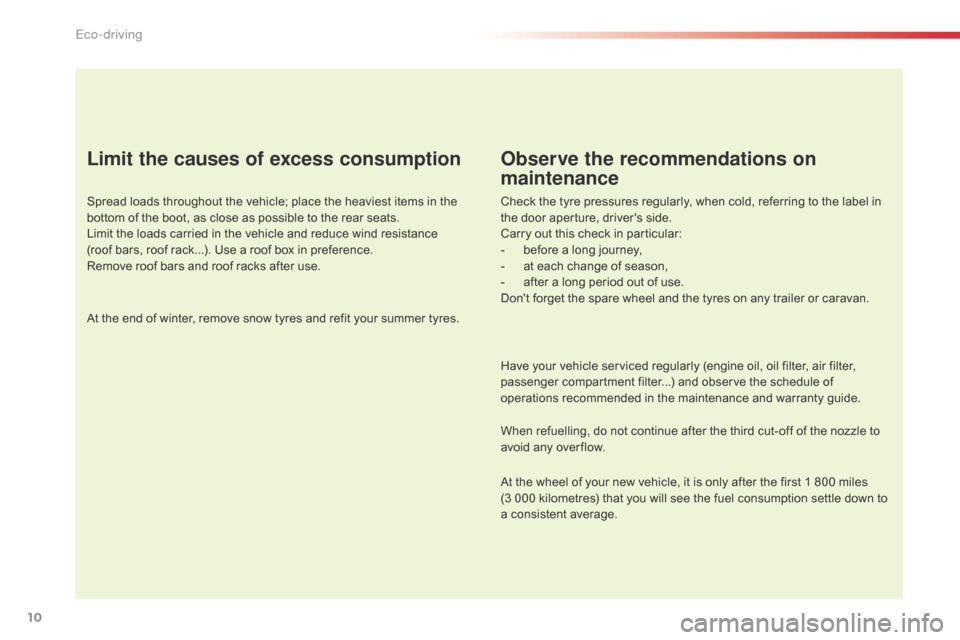
10
C1_en_Chap00c_eco-conduite_ed01-2016
Limit the causes of excess consumption
Spread loads throughout the vehicle; place the heaviest items in the bottom of the boot, as close as possible to the rear seats.
Limit
the loads carried in the vehicle and reduce wind resistance
(roof
bars, roof rack...). Use a roof box in preference.
Remove
roof bars and roof racks after use.
At
the end of winter, remove snow tyres and refit your summer tyres.
Observe the recommendations on
maintenance
Check the tyre pressures regularly, when cold, referring to the label in the door aperture, driver's side.
Carry
out this check in particular:
-
b
efore a long journey,
-
a
t each change of season,
-
a
fter a long period out of use.
Don't
forget the spare wheel and the tyres on any trailer or caravan.
Have
your vehicle serviced regularly (engine oil, oil filter, air filter,
p
assenger compartment filter...) and observe the schedule of
o
perations recommended in the maintenance and warranty guide.
When
refuelling, do not continue after the third cut-off of the nozzle to
a
void any over flow.
At
the wheel of your new vehicle, it is only after the first 1 800 miles
(
3 000 kilometres) that you will see the fuel consumption settle down to
a
consistent average.
Eco-driving
Page 13 of 269
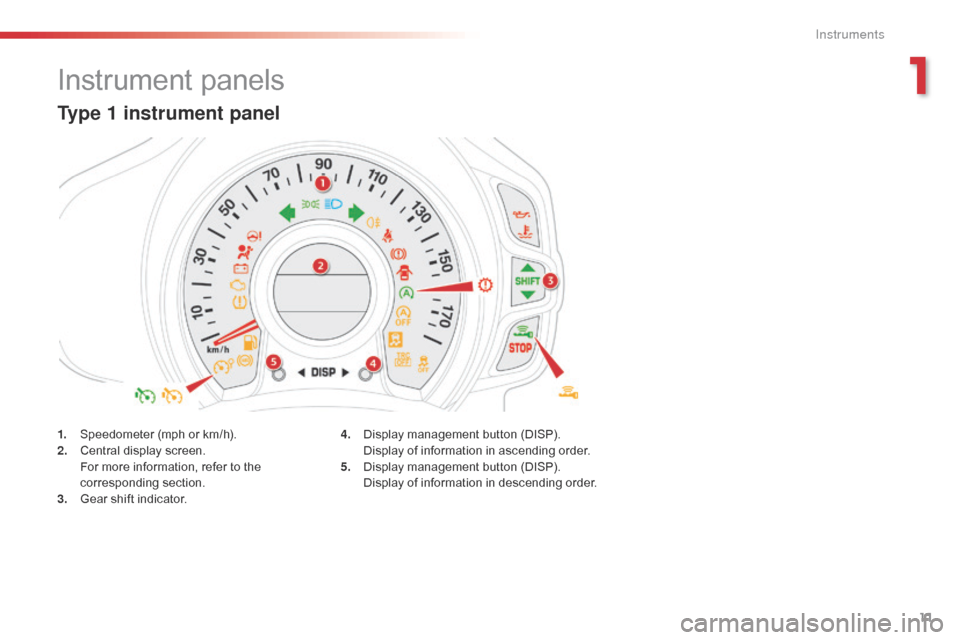
11
C1_en_Chap01_instrument- de-bord_ed01-2016
Instrument panels
Type 1 instrument panel
1. Speedometer (mph or km/h).
2. C entral display screen.
F
or more information, refer to the
c
orresponding
s
ection.
3.
G
ear shift indicator. 4. D
isplay management button (DISP). D
isplay of information in ascending order.
5.
D
isplay management button (DISP).
D
isplay of information in descending order.
1
Instruments
Page 14 of 269
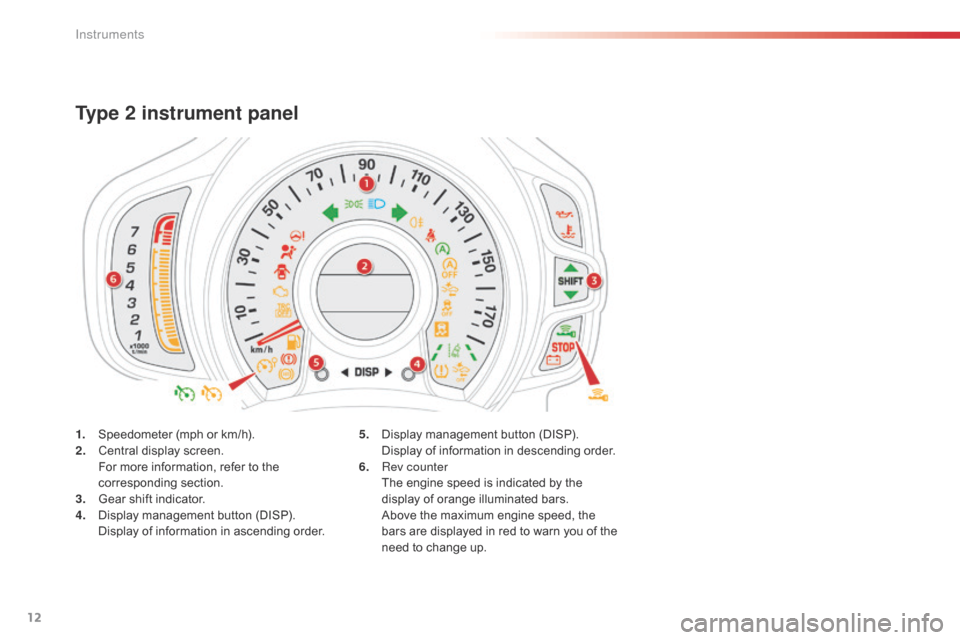
12
1. Speedometer (mph or km/h).
2. C entral display screen.
F
or more information, refer to the
c
orresponding
s
ection.
3.
G
ear shift indicator.
4.
D
isplay management button (DISP).
D
isplay of information in ascending order.
Type 2 instrument panel
5. Display management button (DISP). D
isplay of information in descending order.
6.
R
ev counter
T
he engine speed is indicated by the
d
isplay of orange illuminated bars.
A
bove the maximum engine speed, the
b
ars are displayed in red to warn you of the
n
eed to change up.
Instruments
Page 15 of 269
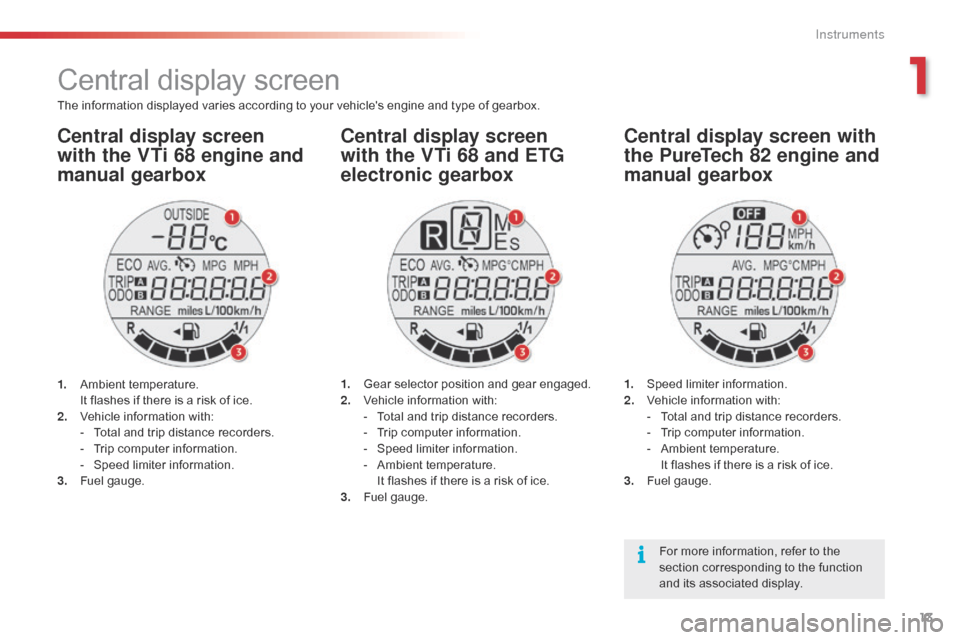
13
C1_en_Chap01_instrument- de-bord_ed01-2016
Central display screen
The information displayed varies according to your vehicle's engine and type of gearbox.
Central display screen
with the VTi 68 engine and
manual gearboxCentral display screen
with the VTi 68 and ETG
electronic gearboxCentral display screen with
the PureTech 82 engine and
manual gearbox
1. Ambient t
emperature. I
t flashes if there is a risk of ice.
2.
V
ehicle information with:
-
T
otal and trip distance recorders.
-
T
rip computer information.
-
S
peed limiter information.
3.
F
uel gauge. 1. G
ear selector position and gear engaged.
2. V ehicle information with:
-
T
otal and trip distance recorders.
-
T
rip computer information.
-
S
peed limiter information.
-
A
mbient
t
emperature.
I
t flashes if there is a risk of ice.
3.
F
uel gauge.1. S
peed limiter information.
2. V ehicle information with:
-
T
otal and trip distance recorders.
-
T
rip computer information.
-
A
mbient
t
emperature.
I
t flashes if there is a risk of ice.
3.
F
uel gauge.
For
more information, refer to the
s
ection corresponding to the function
a
nd its associated display.
1
Instruments
Page 16 of 269
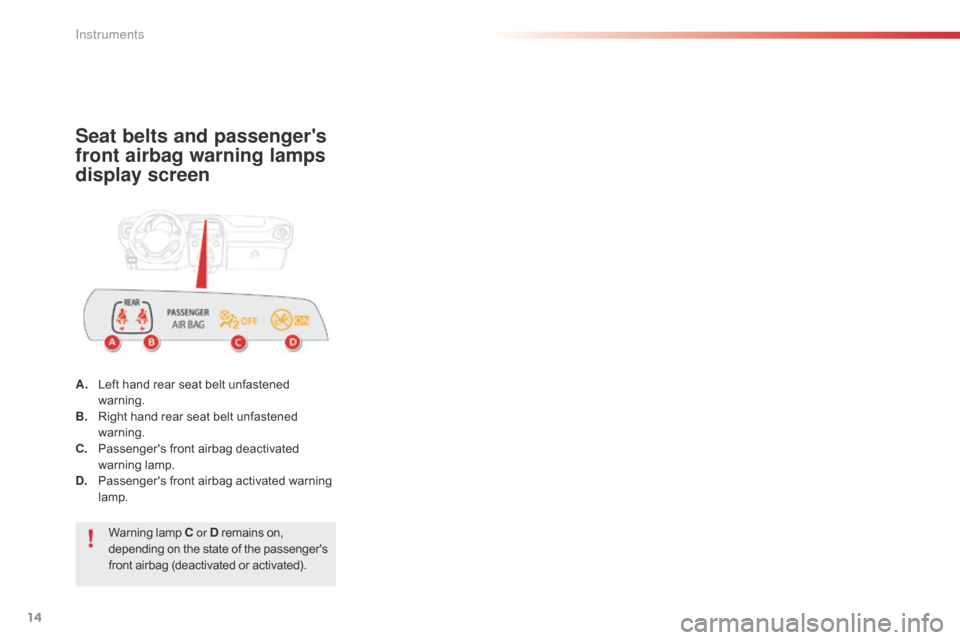
14
Seat belts and passenger's
front airbag warning lamps
display screen
A. Left hand rear seat belt unfastened w
arning.
B.
R
ight hand rear seat belt unfastened
w
arning.
C.
P
assenger's front airbag deactivated
w
arning
lam
p.
D.
P
assenger's front airbag activated warning
lam
p.
Warning
lam
p
C o
r D
remains on,
d
epending
o
n
t
he
s
tate
o
f
t
he
p
assenger's
f
ront airbag (deactivated or activated).
Instruments
Page 17 of 269
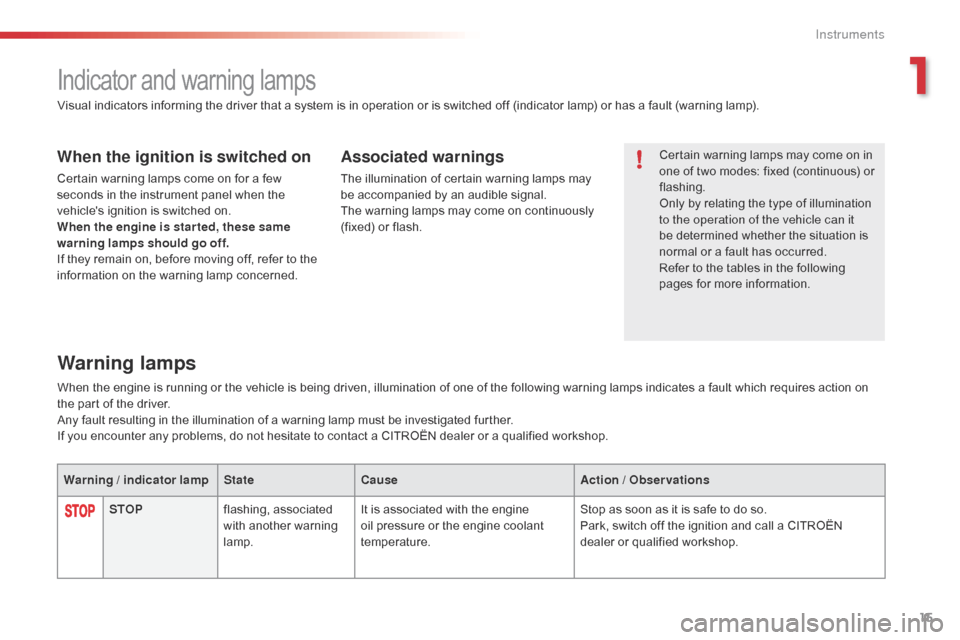
15
C1_en_Chap01_instrument- de-bord_ed01-2016
Indicator and warning lamps
Certain warning lamps may come on in one of two modes: fixed (continuous) or
f
lashing.
Only
by relating the type of illumination
t
o the operation of the vehicle can it
be
determined whether the situation is
n
ormal or a fault has occurred.
Refer
to the tables in the following
p
ages
f
or
m
ore
i
nformation.
Visual
indicators
informing
the
driver
that
a
system
is
in
operation
or
is
switched
off
(indicator
lamp)
or
has
a
fault (warning lamp).When the ignition is switched on
Certain warning lamps come on for a few s
econds in the instrument panel when the
v
ehicle's ignition is switched on.
When the engine is star ted, these same
warning lamps should go off.
If
they remain on, before moving off, refer to the
i
nformation on the warning lamp concerned.
Associated warnings
The illumination of certain warning lamps may be accompanied by an audible signal.
The
warning lamps may come on continuously
(
fixed) or flash.
Warning lamps
STOP flashing, associated w
ith another warning
lam
p.It
is associated with the engine o
il pressure or the engine coolant
t
emperature.Stop
as soon as it is safe to do so.
Park, switch off the
ignition and call a CITROËN
d
ealer or qualified workshop.
When
the engine is running or the vehicle is being driven, illumination of one of the following warning lamps indicates a fault which requires action on
t
he
part
of the driver.
Any
fault
resulting in the illumination of a warning lamp must be investigated further.
If
you
encounter any problems, do not hesitate to contact a CITROËN dealer or a qualified workshop.
Warning
/ indicator lamp
State Cause Action
/ Observations
1
Instruments
Page 18 of 269
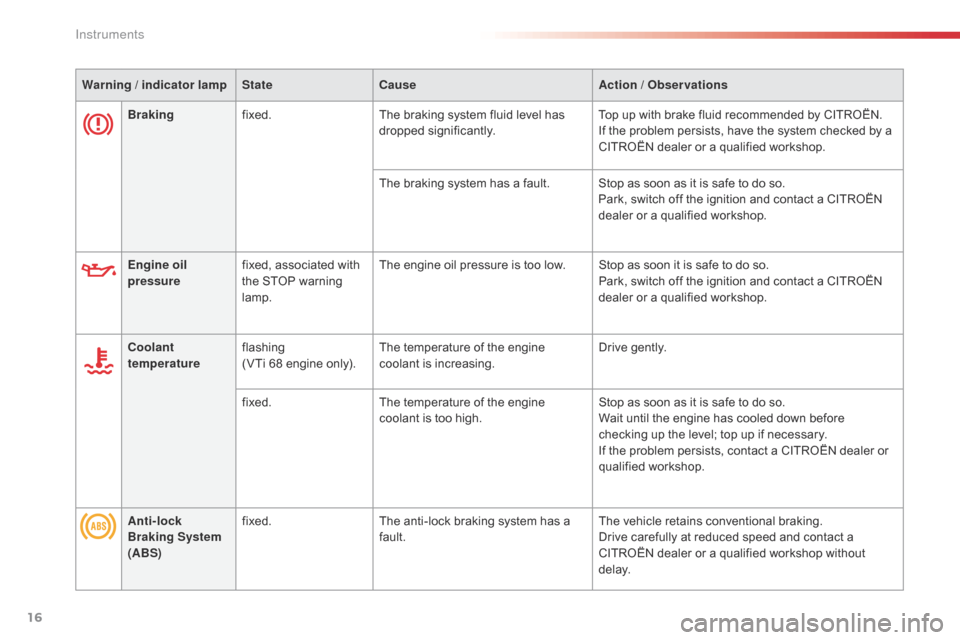
16
Brakingfixed. The braking system fluid level has d
ropped s ignificantly.Top
up with brake fluid recommended by CITROËN.
If the problem persists, have the system checked by a
C
ITROËN dealer or a qualified workshop.
The
braking system has a fault. Stop as soon as it is safe to do so.
Park,
switch off the ignition and contact a CITROËN
d
ealer or a qualified workshop.
Warning
/ indicator lamp
State Cause Action
/ Observations
Engine oil
pressure fixed,
associated with
t
he STOP warning
lam
p.The
engine oil pressure is too low. Stop as soon it is safe to do so.
Park,
switch off the ignition and contact a CITROËN
d
ealer or a qualified workshop.
Coolant
temperature flashing
(
VTi 68 engine only).The
temperature of the engine
c
oolant
i
s
inc
reasing.Drive
gently.
fixed. The
temperature of the engine
c
oolant is too high.Stop
as soon as it is safe to do so.
Wait
until the engine has cooled down before
c
hecking up the level; top up if necessary.
If
the problem persists, contact a CITROËN dealer or
q
ualified
w
orkshop.
Anti-lock
Braking System
(ABS) fixed.
The
anti-lock braking system has a
f
ault.The
vehicle retains conventional braking.
Drive
carefully at reduced speed and contact a
C
ITROËN dealer or a qualified workshop without
d
e l ay.
Instruments
Page 19 of 269
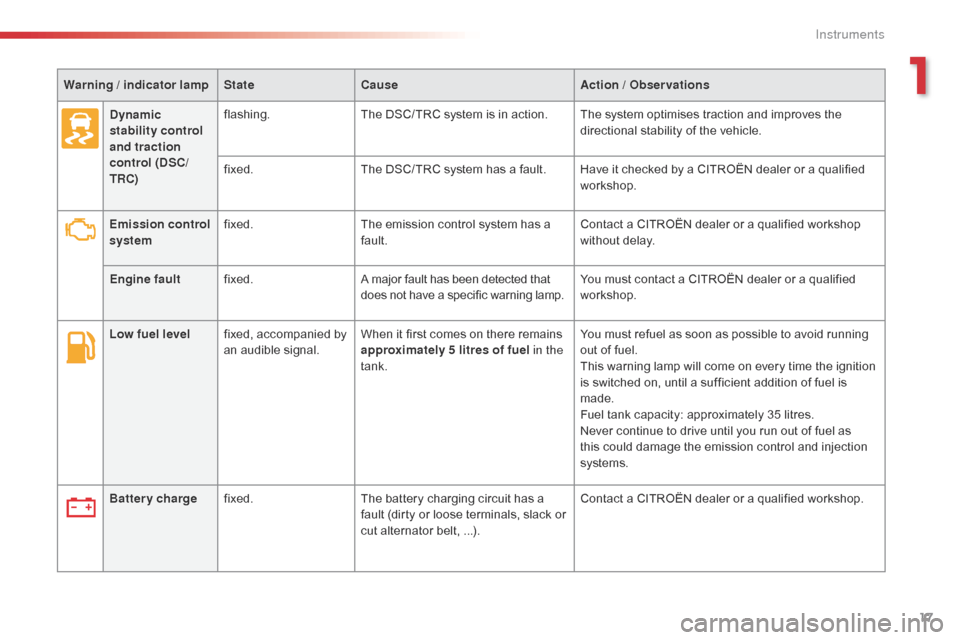
17
C1_en_Chap01_instrument- de-bord_ed01-2016
Low fuel levelfixed, accompanied by a
n audible signal.When
it first comes on there remains a
pproximately 5 litres of fuel in the
tank. You
must refuel as soon as possible to avoid running o
ut of fuel.
This
warning lamp will come on every time the ignition
i
s switched on, until a sufficient addition of fuel is
m
ade.
Fuel
tank capacity: approximately 35 litres.
Never
continue to drive until you run out of fuel as
t
his could damage the emission control and injection
s
ystems.
Battery charge fixed. The
battery charging circuit has a
f
ault (dirty or loose terminals, slack or
c
ut alternator belt, ...).Contact
a CITROËN dealer or a qualified workshop.
Emission control
system
fixed.
The emission control system has a
f
ault.
Contact a CITROËN dealer or a qualified workshop
w
ithout delay.
Engine fault fixed. A major fault has been detected that
d
oes not have a specific warning lamp.
You must contact a CITROËN dealer or a qualified
w
orkshop.
Dynamic
stability control
and traction
control (DSC/
TRC)
flashing.
The DSC/ TRC system is in action. The system optimises traction and improves the
d
irectional stability of the vehicle.
fixed. The DSC/ TRC system has a fault. Have it checked by a CITROËN dealer or a qualified
w
orkshop.
Warning
/ indicator lamp
State Cause Action
/ Observations
1
Instruments
Page 20 of 269
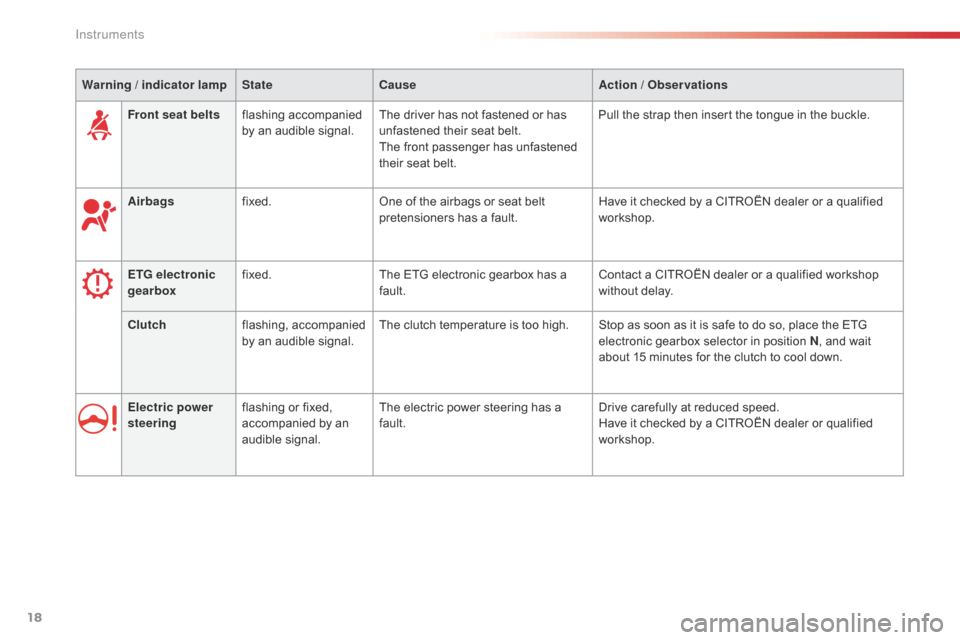
18
Front seat beltsflashing a ccompanied b
y an audible signal.The
driver has not fastened or has u
nfastened their seat belt.
The
front passenger has unfastened
t
heir seat belt.Pull
the strap then insert the tongue in the buckle.
Warning
/ indicator lamp
State Cause Action
/ Observations
Electric power
steering flashing
or fixed,
a
ccompanied by an
a
udible
s
ignal.The
electric power steering has a
f
ault.Drive
carefully at reduced speed.
Have
it checked by a CITROËN dealer or qualified
w
orkshop.
Airbags
fixed. One
of the airbags or seat belt
p
retensioners has a fault.Have
it checked by a CITROËN dealer or a qualified
w
orkshop.
ETG electronic
gearbox fixed.
The
ETG electronic gearbox has a
f
ault.Contact
a CITROËN dealer or a qualified workshop
w
ithout delay.
Clutch flashing,
a
ccompanied
b
y an audible signal.The
clutch temperature is too high. Stop as soon as it is safe to do so, place the ETG
e
lectronic gearbox selector in position N,
and wait
a
bout 15 minutes for the clutch to cool down.
Instruments